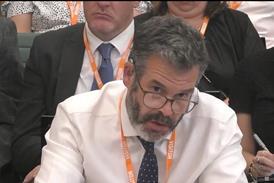For the sake of the NHS and its patients, the Department of Health must listen to practitioners before moving forward with fixed costs.
The Department of Health is looking to introduce a fixed-costs scheme for claimant solicitor fees as a way of tackling the financial burden on the NHS arising from successful claims of clinical negligence.
But the reasoning behind the proposed cost-saving solution – the introduction of fixed recoverable costs for what it perceives to be ‘low-value claims’ – seems to be based on a number of misconceptions. The introduction of fixed costs, especially if set too low, could seriously undermine the ability of people harmed by negligent NHS care to receive the specialist legal advice they need to obtain the compensation they are entitled to in law.
The Law Society’s response to the government’s pre-consultation pulled no punches. We made it clear last month that the proposed changes are highly premature, particularly given the fact that the changes introduced by the Legal Aid, Sentencing and Punishment of Offenders Act 2012 (LASPO) have not been fully quantified. Our submission drew attention to the fact that measures to reduce legal costs through LASPO must be fully evaluated to understand their impact. Only then can any next steps be decided.
During the preparation of its pre-consultation response, the Society began seeking the views of members. This crucial conversation has yielded helpful information and our engagement will continue in the run-up to the government’s formal consultation – due to be launched in December – in order to capture and effectively communicate member concerns about what is being proposed.
A theme that features in the hundreds of responses to our recent questionnaire is the fact that there is no correlation between the value of a clinical negligence case and its complexity. As such, there is a real danger that any fixed-costs regime based on value of claims would fail to recognise the amount of work required to deal with the nuances and complexities that frequently arise in clinical negligence cases.
We feel strongly that the government’s priority should be to reduce incidents of harm, rather than focus on reducing the legal costs incurred as a result of patients seeking the compensation they need to help them get on with their lives after suffering often devastating injuries.
However people feel about access to justice and the significant reductions in legal aid spending, few would deny that it is in the public interest that patients who are harmed by negligent NHS care are appropriately compensated; and that the problems with NHS care which often result in significant harm can be brought to light, lessons learned and crucial changes made within the NHS to prevent recurrence.
Responses to our survey frequently emphasised the important role the claims system plays in ensuring that cases of clinical negligence are properly investigated. All respondents were critical of the fact that the government’s emerging proposals fail to address the root causes of these claims and could seriously curb patients’ ability to pursue cases, which can only be in the public interest. As one participant noted: ‘The overriding issue here should be improving standards in the NHS, particularly in relation to birth injury given that this is the biggest drain on NHS resources in terms of damages payments and claimant costs. If lower-value claims are no longer investigated then failings in the NHS will not be identified and will continue happening.’
We have yet to see the detail of the actual proposals, but views emerging from the survey make clear that implementation of a fixed-costs regime could seriously impinge upon access to justice. As one practitioner pointed out: ‘There is a risk that the levels will be set too low for a reasonable job to be done for a reasonable return. This opens the door for inexperienced practitioners to take on the work, which in turn is likely to produce a poor outcome for the client.’
It is hardly surprising that the predominant view of respondents was that proper representation takes time and requires access to medical experts. Participants frequently pointed out that the finances available under a fixed-costs regime might be inadequate to fund a proper investigation and that it may be impossible to pay for the expert reports that are essential to making a case.
Moreover, questions were continually raised as to whether experts, or ‘the best experts’, will actually be willing to work for capped rates proposed by the government. If they refuse and their fees have to be ‘topped up’ by the claimant, this would effectively reduce the amount of compensation received by negligently harmed patients. Respondents repeatedly made reference to the number of experts required to establish both breach of duty and causation of injury. This expert knowledge is essential in establishing what went wrong, and that the care was negligent and resulted in harm to the patient.
One respondent noted: ‘In the vast majority of clinical negligence cases it is not possible to prove a case to the level required by the law for a claimant to be successful relying on one expert alone.’ It was argued that experts will only take on the work if they feel that they are receiving adequate remuneration. Observations were also made that claimant practitioners consider that there is already ‘an uneven playing field’ in this area, with many arguing that any cap on fees must apply to expert costs on both sides.
It was also emphasised in the responses we received that solicitors play an important role in screening cases and thereby significantly reduce the number of unmeritorious claims which would otherwise be brought against the NHS. As the risk of pursuing cases has been passed to the patient and their solicitor with the introduction of no win, no fee (in the form of conditional fee agreements and damages-based agreements), the fees earned in successful cases have to cover the large number of cases where solicitors carry out an initial investigation and then do not proceed with the case.
As a result, it is quite logical that respondents raised concerns that clinical negligence work would cease to be economically viable if a fixed-costs regime was introduced which failed to appropriately compensate claimant solicitors for the work they do in screening out unmeritorious claims. If solicitors cannot afford to carry out such screening, the costs may be incurred by the NHS.
A further theme was the tension between conducting cases within the constrictions of a fixed-costs regime while ensuring compliance with professional duties. One respondent said: ‘We would be restricted in the thoroughness of our ability to investigate claims. We would be concerned about missing aspects because of financial restrictions and being professionally negligent as a consequence. We will probably have to turn down cases that may well be sound in terms of liability but [for which] due to financial constraints we could not correctly investigate or obtain appropriate evidence.’
A number of participants also referred to the possibility that a fixed-fees scheme could lead to the reorganisation of some businesses so that more of the investigation would be handled by less-experienced staff in order to reduce costs. This could mean that key issues are missed.
One particularly worrying theme that emerged time and again was the disproportionate effect that the changes would have on access to justice for more vulnerable citizens. This is because loss of earnings is a major consideration in assessing the value of a claim. For example, claimants on low incomes, the disabled, people with mental health conditions, the elderly and children are much more likely to fall within the ‘lower-value’ claims bracket.
Some of the most marginalised in society may be left without legal advice and representation if the proposed fixed-fees scheme results in solicitors not being able to take on these cases because they are not economically viable. Many respondents highlighted the fact that, even if people had the means to consult a solicitor, the amount of compensation they received would be reduced in practical terms as a result of the amount they would pay in fees. Such a discriminatory effect on some of the most marginalised in society is deeply concerning.
The most common category of cases where it was felt that a fixed-costs regime would be wholly inappropriate was in fatal cases. Claims for compensation in fatal cases are capped in value where there are no dependants. This means they would fall within the lowest suggested threshold referred to in the consultation.
We would be deeply concerned if incidents where someone has died as a result of negligent care are not properly investigated because solicitors cannot afford to represent the deceased’s family. This also highlights the fact that the amount of compensation that may be awarded does not reflect the true value to those who have been harmed.
I repeat the call made last month by Law Society chief executive Catherine Dixon: for the sake of the NHS, its patients and the specialist practitioners who dedicate their careers to supporting harmed patients, the Department of Health must listen carefully to legal professionals who undertake this vital work.
We are very grateful for the detailed and considered responses to our questionnaire. We are now asking solicitors for case studies to help formulate our consultation response. We will continue to seek the views of practitioners as we await the government’s proposals.
Jonathan Smithers is president of the Law Society






























No comments yet